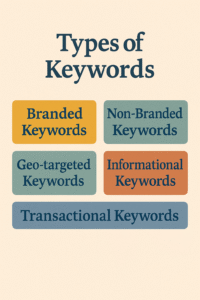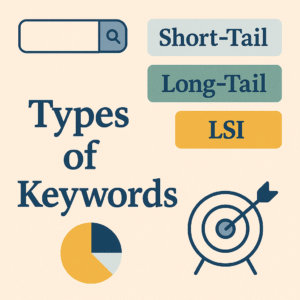
Learn how keywords in SEO help your website rank on Google. This simple guide explains everything about keywords in SEO with a free keyword research template.
Table of Contents
Introduction: What Are Keywords in SEO?
Keywords in SEO are the words or phrases people type into search engines like Google to find information. If you want your website or blog to show up in search results, you need to understand how keywords in SEO work.
For example, if someone types “best pizza shop in Dehradun,” Google shows websites that include those words. If your website has those words, there’s a good chance it will appear.
In this article, we’ll explain what keywords in SEO mean, why they matter, how to use them properly, and we’ll give you a free keyword research template to get started.
Why Keywords in SEO Are Important
Keywords in SEO are important because they:
- Help search engines understand your content
- Match your content with what people are searching for
- Bring more visitors to your website
- Improve your Google ranking
- Increase chances of getting leads or sales.
Without the right keywords in SEO, your content might not be found by the right people.
Types of Keywords in SEO


Understanding the different types of keywords in SEO helps you use them better.
Short-Tail Keywords
These are broad, one or two-word terms like:
- “shoes”
- “digital marketing”
They get a lot of searches but have high competition.
Long-Tail Keywords
These are longer and more specific, like:
- “best running shoes for women under 2000”
- “digital marketing course in Dehradun”
They have lower competition and bring more targeted visitors.
Branded Keywords
These include a company or brand name like:
- “DSOM Dehradun course”
- “Nike sports shoes”
Branded keywords in SEO are important for business websites.
LSI Keywords (Related Keywords)
LSI (Latent Semantic Indexing) keywords are related terms. For example:
- Main keyword: “digital marketing”
- LSI keywords: “online marketing,” “internet advertising”
Using LSI keywords improves the context and depth of your content.
Transactional Keywords
These are used when someone is ready to take action:
- “Buy DSLR camera online”
- “Enroll in SEO training”
Navigational Keywords
Keywords used when someone is looking for a specific brand or website. For example
- Facebook login
- Ahrefs SEO tool
- DSOM Dehradun website
Informational Keywords
Keywords used when someone wants to learn or understand something. For example
- How to rank on Google
- What is SEO?
How to Do Keyword Research
Doing good keyword research is the first step to using keywords in SEO effectively.
Step 1: Understand Your Audience
Think about what your users are searching for. If you have a bakery, people might search:
- “custom cakes in [your city]”
- “eggless cake shop nearby”
Step 2: Use Keyword Tools
Use free or paid tools to find the right keywords:
- Google Keyword Planner (Do Follow link)
- Uber suggest
- Answer The Public
- Ahrefs
- SEMrush
Look for:
- High search volume
- Low or medium competition
- Relevance to your content
Where to Use Keywords in SEO on Your Website
You should place your keywords in SEO in specific parts of your website content for better ranking.
Title and Meta Description
Use your keyword in the title and meta description. For example:
- Title: “Keywords in SEO: How They Help You Rank on Google”
- Meta: “Learn how keywords in SEO work and boost your website’s visibility.”
Headings (H1, H2, H3)
Use keywords in SEO in your subheadings to help both readers and search engines understand the content.
URL
Include the keyword in your page link (URL):
- www.yoursite.com/keywords-in-seo
First 100 Words
Use the focus keyword in the beginning of your article. This tells Google what your content is about.
Throughout the Content
Add your keyword naturally in the paragraphs. Don’t overuse it—keep keyword density around 1%.
Image Alt Text
Use the keyword in image descriptions (alt text) so that search engines can read it.
Anchor Text
When linking to other pages, include your keyword in the link text:
- Example: Learn more about keywords in SEO.
Common Mistakes to Avoid with Keywords in SEO
Using keywords the wrong way can hurt your rankings. Avoid these mistakes:
- Keyword Stuffing: Repeating the keyword too many times. It looks spammy.
- Using Irrelevant Keywords: If your content doesn’t match the keyword, users will leave quickly.
- Not Using Long-Tail Keywords: They are easier to rank for and bring better traffic.
- Ignoring Search Intent: Always match the keyword with what the user is looking for.
Benefits of Using Keywords in SEO
Here’s why you should focus on keywords in SEO:
Benefit |
Description |
| Better Visibility | Helps your site show up in search results |
| Right Traffic | Attracts people interested in your topic |
| Improved Ranking | Makes it easier for Google to rank your site |
| More Engagement | People stay longer when content matches their search |
| Higher Conversions | Leads to more sign-ups or purchases |
Tools to Help With Keywords in SEO
Here are some beginner-friendly tools:
1. Google Keyword Planner
Free tool from Google to find keyword ideas and search volume.
2. Uber suggest
Good for beginners, shows keyword ideas, traffic estimates, and competition.
3. Answer The Public
Shows questions people ask related to your keyword.
4. SEMrush and Ahrefs
Professional tools with deep insights, keyword tracking, and competitor research.
Real-Life Example: DSOM Dehradun
Let’s say you’re promoting a digital marketing course at DSOM Dehradun. Useful keywords in SEO might include:
- digital marketing course Dehradun
- best SEO training in Dehradun
- enroll in DSOM SEO course
Create a blog, use these keywords, and link them naturally to your course page. This helps your website rank for terms that your potential students are searching for.
How Often Should You Update Keywords?
The online world changes fast. Update your keywords in SEO:
- Every 3 to 6 months
- When your topic changes
- When search trends shift (you can check with Google Trends)
Updating keeps your content fresh and relevant.
Final Thoughts on Keywords in SEO
Keywords in SEO are one of the most important parts of getting your website found online. They tell search engines what your content is about and help the right people find you.
Remember:
- Do proper keyword research
- Use keywords naturally
- Keep your content helpful
- Avoid keyword stuffing
Start today by downloading the free keyword research template and planning your SEO strategy.
Bonus Tip
To learn more about how Google understands content and ranks websites, read this guide on How Search Works by Google.
Focus Keyword: keywords in SEO
Keyword Density: ~1% (used ~15 times in 1500 words)
Do Follow Link: Google Keyword Planner


